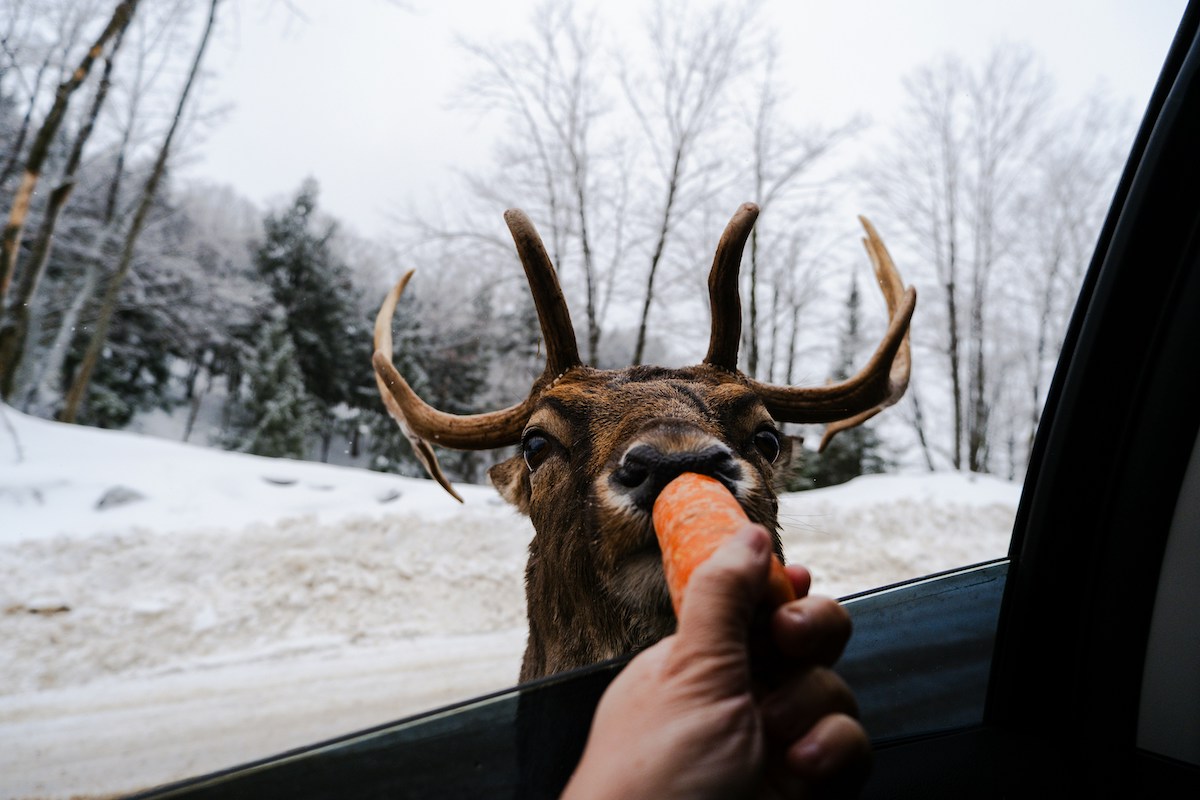What should you do if you hit a deer? If you find yourself in this position, here’s what you need to know in terms of car insurance coverage, and filing a claim.
If you live in Canada, chances are you’ve had a few encounters with wildlife while driving, and unfortunately hitting a deer is not uncommon.
It’s a scenario many drivers dread, yet understanding the ins and outs of insurance coverage can alleviate stress during these incidents.
From navigating claims to understanding policy details, hitting a deer isn’t just about the damage to your vehicle; it’s about knowing your rights and responsibilities as an insured driver.
In this post, we’re explaining how to navigate the complexities of car insurance in the aftermath of colliding with wildlife.
Or if you’d rather speak directly with a car insurance broker, we can help with that too.
Click ahead to find what you need:
- What should you do when you hit a deer?
- Do you have to call someone if you hit a deer?
- Does insurance cover hitting a deer?
- How will hitting a deer affect my insurance?
What should you do when you hit a deer?
Hitting a deer is a startling and potentially dangerous situation.
Here’s what to do if you’ve had a collision with wildlife:
Assess the Situation:
- Pull over safely: Move your vehicle to a safe location away from traffic.
- Turn on your hazard lights: Alert other drivers to your presence on the road.
- Check for injuries: Ensure that everyone in the vehicle is safe and uninjured. Call 911 if there are injuries.
- Contact Authorities: In many jurisdictions, it’s required to report collisions with wildlife, including deer. If you hit a large animal like a deer or moose in Ontario, contact the local police or the Ministry of Natural Resources. In Quebec, collisions with certain animals must be declared to the wildlife protection officer. Failure to do so may result in demerit points and fines. Authorities should also be contacted if there are any injuries to passengers, or if the animal is impeding the road.
Document the Incident:
- Take Photos: Take pictures of the scene, including any damage to your vehicle and the deer. This is crucial to ensuring your claim is processed smoothly.
- Record Details: Note the time, location, and any other relevant information about the incident.
Evaluate Vehicle Damage:
- Assess the Damage: Check your vehicle for any signs of damage caused by the collision.
- Ensure Safety: Avoid attempting repairs on the road, especially if it’s dark or visibility is poor. Depending on the extent of the damage you may also need to call a tow truck, or bring your car to a mechanic. Depending on your insurance, this may be covered under your comprehensive coverage. Be sure to confirm this with your insurer.
Contact Your Insurance Provider:
- Notify Your Insurer: Inform your insurance company about the collision as soon as possible, and provide them with the information required to make a claim.
- Understand Coverage: Review your policy to understand coverage options for collisions involving wildlife.
Do you have to call someone if you hit a deer?
Yes, in many cases, you are required to report collisions with deer or other wildlife to the appropriate authorities.
Here’s what you need to know:
Legal Obligations:
- Provincial Regulations: Depending on where you live, you may be required by law to contact the conservation officer, the Ministry of Natural Resources (in Ontario) and the local police. If the animal is impeding traffic, is injured, or is creating an additional hazard to oncoming drivers, authorities should be called.
- Compliance with Regulations: Failure to report such incidents may result in legal consequences as per the rules and regulations in your provinces.
Insurance Considerations:
- Notification Requirement: Most insurance policies also mandate reporting any collisions, including those involving deer, to the insurance provider.
Claims Process: Reporting the incident promptly ensures a smoother claims process and helps assess coverage options.
Does insurance cover hitting a deer?
Hitting a deer can lead to significant damage to your vehicle and pose potential safety risks.
Here’s what you need to know about insurance coverage:
- Comprehensive Coverage: Comprehensive insurance typically covers damage to your vehicle from incidents other than collisions with another car. This includes hitting a deer, as well as damage from theft, vandalism, and natural disasters. However, certain coverages like calling a tow truck after an incident may require special coverage. Be sure to check with your insurance provider about what you are and are not covered for.
- Coverage Limits: Review your policy to understand the extent of coverage for hitting a deer, including any deductible requirements.
- Impact on Premiums: Generally, filing a claim for hitting a deer won’t directly impact your insurance premiums as it’s considered a non-fault incident. However, frequent claims may raise red flags for insurers, potentially affecting your rates over time.
- Mitigating Risks: If you don’t already have it, consider adding comprehensive coverage to your policy if you live in an area with high deer populations or frequent wildlife crossings. Stay vigilant and practice defensive driving techniques, especially in areas known for frequent deer activity.
How will hitting a deer affect my insurance?
Hitting a deer can have implications for your insurance coverage and rates.
Here’s what you need to know about the potential impacts:
Insurance Claims and Coverage:
- Comprehensive Coverage: If you have comprehensive insurance, hitting a deer typically falls under this coverage, protecting you against damages from non-collision incidents.
- Filing a Claim: You’ll need to file a claim with your insurance provider to cover the damages resulting from hitting a deer.
- Coverage Limits: Review your policy to understand the extent of coverage for hitting a deer, including deductibles and any limitations.
- Non-Fault Incident: In most cases, hitting a deer is considered a non-fault incident, meaning it shouldn’t directly impact your insurance premiums.
- Frequency of Claims: However, while a single deer collision may not affect your rates, multiple claims within a short period could lead to increased premiums.
Considerations for Drivers:
- Risk Assessment: Insurance companies consider various factors, including location and driving history, when determining premiums.
- Defensive Driving: Taking precautions, such as driving at appropriate speeds and remaining alert can help reduce the risk of colliding with deer and other wildlife.
Consultation and Guidance:
- Insurance Advisor: If you have any doubts, speak with your insurance advisor to understand how hitting a deer may affect your specific policy and coverage.
- Claims Process: Your insurance provider can guide you through the claims process and help address any concerns or questions you may have.
Navigating the aftermath of hitting a deer requires understanding your insurance coverage and potential implications for your rates.
By staying informed and proactive, you can mitigate the financial and logistical challenges associated with collisions with wildlife.
Wrap-up
So, there you have it.
Stay sharp on the road, especially during high-deer-activity times, and ensure you have the right auto insurance coverage in place in case of accidents.
If you do hit a deer while driving, make sure that you document everything, notify the authorities, and keep your insurer in the loop.
Have questions?
Get in touch.


